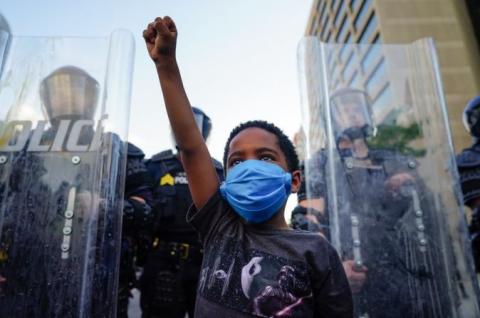
MOGC joined over 350 organizations in sending the following letter (excerpted here) to the leaders of the House of Representatives urging them to support H.R .40, a bill to create a commission to study the legacy of slavery and the prospect of reparations for African-Americans. The following article was published in the March-April 2022 issue of NewsNotes.
On behalf of [our coalition], we urge Congress to immediately bring House Resolution (H.R.) 40, the Commission to Study and Develop Reparation Proposals for African-Americans Act, to a full vote on the House floor.
H.R. 40 has a record 215 members of Congress committed to voting “yes” when the bill comes to the House floor. With this level of support, it should pass the House, so long as Leadership sticks to public promises to get behind it and advance the bill. People in the US are now more eager than ever to pull back the curtain on institutions to see whether they have helped to advance or stall racial progress, and those institutions include the US Congress. As states, cities, and other institutions, including the state of California; Providence, Rhode Island; Burlington, Vermont; Tullahassee, Oklahoma; Greenbelt, Maryland; Detroit, Michigan; Evanston, Illinois; Georgetown University; the Jesuits; and others pursue reparations at an accelerated pace, it would be sheer irony for the federal government, which sanctioned the kidnapping and trafficking in human beings that slavery entailed, and maintained subsequent anti-Black laws and institutions, to continue to lag behind.
H.R. 40 would establish an expert commission to study the legacy of slavery and how the failure to address harms stemming from it have resulted in huge racial disparities between white and Black people in: the ability to accumulate wealth; to access health care, education, housing and employment opportunities; environmental outcomes; and policing, among other things. The commission would also recommend proposals for how to provide repair for what the study reveals. This bill does not authorize payments or any specific remedy. It simply creates a commission to study the problem, gather relevant information, extensively consult with impacted communities, and recommend solutions. Like the commission that investigated the forced relocation and wrongful incarceration of Japanese Americans during World War II, H.R. 40 can help pave the way for a critical and truthful reckoning and accounting for past harms and the present harms that flow from them…
We, the undersigned organizations, firmly believe that addressing pervasive anti-Black racism and providing reparations, long overdue, cannot wait another day, month, year, or decade. We are in a once-in-a-lifetime moment that we cannot let slip away if we are to begin the process of righting the country’s wrongs. Voters will remember what Congress did and did not do when it had the power to act. It has that power now. It should ask itself: How do we want history to remember us?
Read the full letter here: https://bit.ly/3HtKcOO.
Faith in action: Take action to ask Congress to support H.R. 40: https://bit.ly/HR40mogc
